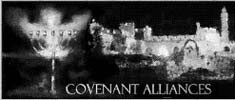Washington, DC 5 February 2007

The Covenant Alliance, host of a reception and event for Benny Elon.
A modest request, for sure. Particularly, when it comes from individuals who have dedicated themselves to nonviolent witness and resistance and often are subjected to the same suffering and violence as the oppressed individuals that they are trying to protect. But it also is a request that can sometimes be frustrating to fulfill.
Next week, for example, my hometown of Washington, DC will host two Holy Land visitors. The warrior, Knesset Minister Benny Elon, will arrive with a hero’s welcome on Capitol Hill as keynote speaker for a reception to launch Congress’ newly formed “Israel Allies Caucus.” Sponsored by several members of Congress, invited guests will include prominent political figures and national Christian leaders.
But for those of us who are familiar with Elon’s background, he is recognized as a political figure with strong ties to settler violence. A Settler himself, he has personally lead gangs into Palestinian homes, including a 2003 attack on homes at Sheikh Jarrah which ended up with a two-year-old Palestinian child being thrown out of a two-story window [1].
In contrast, Reverend Naim Ateek, the Anglican-Palestinian pastor who founded Sabeel, a nonviolent faith-based liberation movement, will also arrive here that same week and his small but loyal supporters have arranged a modest lecture at a local university and perhaps a lunch with some local pastors. It’s not that Rev. Ateek is reluctant to meet with Congress or prominent Christian leaders in the West. It’s just that, as a peacemaker, he is not well-known in these circles. My hometown is, after all, the global headquarters for Pax America. And Ateek, who was raised in Nazareth, advocates a different Way towards peace, one that is based on the teachings of his town’s most prominent native son.
During the Capitol Hill reception, MK Elon will probably mention his highly-publicized “Elon Peace Plan” which essentially advocates the transfer/expulsion of the indigenous Palestinian population [2]. In contrast, Rev. Ateek would be able to provide these influential listeners with very intimate insight on the implications of such a plan, as he and his family were victims of the 1948 expulsions known as the Nakba.
So that I might fulfill my promise to those new friends I met in the Holy Land, I will call my Congressman asking that he not attend the Elon event. I will ask my friends to also make calls. Maybe if I can manage it, I will use my advantage of being a local-yokel to run up-and-down the halls of the Congressional offices, dropping off flyers about Elon’s less-than-peaceful background.
But in the back of my mind, I will be pondering on what more I should do. My Christian roots remind me of the Gospel drama when the Procurator of the time, Pilate, offers the Jerusalem crowd an opportunity to choose freedom for one of two prisoners, either Jesus of Nazareth or the warrior Barabbas. While the “we choose Barabbas” option prevails, undoubtingly, there were a few lone voices, who, despite their feelings of helplessness, campaigned for an alternative. I pray that this time, there might be an outcome different than the one rendered on that fateful day in the Jerusalem Square. I hope that more of us will choose the peacemakers.
Susan Kerin, an American Catholic residing in Rockville, MD, served as a 2006 peace delegate with the Christian Peacemaker Teams (CPTs). She is the author of the soon-to-be-published book “Prophecy Interrupted” on Christian Zionism.
Footnotes
1. “Israeli Minister Accompanies Gang of Criminals to Break into Homes”, International Commitee Against Home Demolitions, 4 May 2003.
2. “Israeli Expulsion Idea Gains Steam”, Ben Lynfield, Christian Science Monitor, 6 February 2002.
Related Links

